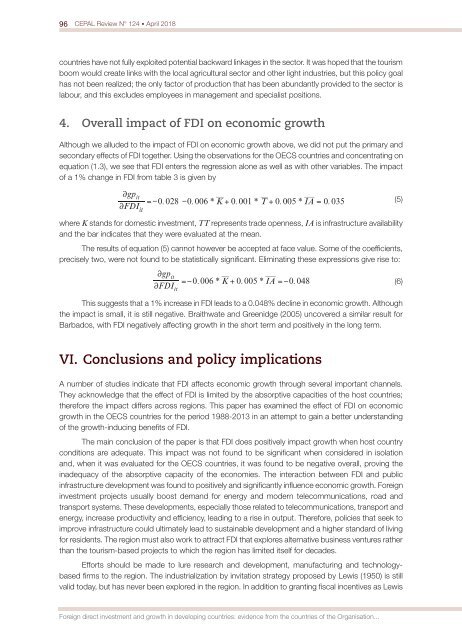CEPAL Review no. 124
April 2018
April 2018
Create successful ePaper yourself
Turn your PDF publications into a flip-book with our unique Google optimized e-Paper software.
96 <strong>CEPAL</strong> <strong>Review</strong> N° <strong>124</strong> • April 2018<br />
countries have <strong>no</strong>t fully exploited potential backward linkages in the sector. It was hoped that the tourism<br />
boom would create links with the local agricultural sector and other light industries, but this policy goal<br />
has <strong>no</strong>t been realized; the only factor of production that has been abundantly provided to the sector is<br />
labour, and this excludes employees in management and specialist positions.<br />
4. Overall impact of FDI on eco<strong>no</strong>mic growth<br />
Although we alluded to the impact of FDI on eco<strong>no</strong>mic growth above, we did <strong>no</strong>t put the primary and<br />
secondary effects of FDI together. Using the observations for the OECS countries and concentrating on<br />
equation (1.3), we see that FDI enters the regression alone as well as with other variables. The impact<br />
of a 1% change in FDI from table 3 is given by<br />
(5)<br />
where K stands for domestic investment, TT represents trade openness, IA is infrastructure availability<br />
and the bar indicates that they were evaluated at the mean.<br />
The results of equation (5) can<strong>no</strong>t however be accepted at face value. Some of the coefficients,<br />
precisely two, were <strong>no</strong>t found to be statistically significant. Eliminating these expressions give rise to:<br />
(6)<br />
This suggests that a 1% increase in FDI leads to a 0.048% decline in eco<strong>no</strong>mic growth. Although<br />
the impact is small, it is still negative. Braithwate and Greenidge (2005) uncovered a similar result for<br />
Barbados, with FDI negatively affecting growth in the short term and positively in the long term.<br />
VI. Conclusions and policy implications<br />
A number of studies indicate that FDI affects eco<strong>no</strong>mic growth through several important channels.<br />
They ack<strong>no</strong>wledge that the effect of FDI is limited by the absorptive capacities of the host countries;<br />
therefore the impact differs across regions. This paper has examined the effect of FDI on eco<strong>no</strong>mic<br />
growth in the OECS countries for the period 1988-2013 in an attempt to gain a better understanding<br />
of the growth-inducing benefits of FDI.<br />
The main conclusion of the paper is that FDI does positively impact growth when host country<br />
conditions are adequate. This impact was <strong>no</strong>t found to be significant when considered in isolation<br />
and, when it was evaluated for the OECS countries, it was found to be negative overall, proving the<br />
inadequacy of the absorptive capacity of the eco<strong>no</strong>mies. The interaction between FDI and public<br />
infrastructure development was found to positively and significantly influence eco<strong>no</strong>mic growth. Foreign<br />
investment projects usually boost demand for energy and modern telecommunications, road and<br />
transport systems. These developments, especially those related to telecommunications, transport and<br />
energy, increase productivity and efficiency, leading to a rise in output. Therefore, policies that seek to<br />
improve infrastructure could ultimately lead to sustainable development and a higher standard of living<br />
for residents. The region must also work to attract FDI that explores alternative business ventures rather<br />
than the tourism-based projects to which the region has limited itself for decades.<br />
Efforts should be made to lure research and development, manufacturing and tech<strong>no</strong>logybased<br />
firms to the region. The industrialization by invitation strategy proposed by Lewis (1950) is still<br />
valid today, but has never been explored in the region. In addition to granting fiscal incentives as Lewis<br />
Foreign direct investment and growth in developing countries: evidence from the countries of the Organisation...


















